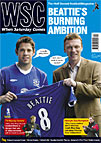 For the second times in four years, Southampton have replaced a boss with no experience with a big noise. Tim Springett reports on some strange parallels
For the second times in four years, Southampton have replaced a boss with no experience with a big noise. Tim Springett reports on some strange parallels
Unexpected as Harry Redknapp’s swift defection from Portsmouth to their nearest and bitterest rivals might have appeared, Southampton fans had a sense of déjà vu. The wheel began turning in the summer of 2001 as Saints were moving into the St Mary’s Stadium, mortgaged up to the hilt and at risk of severe financial consequences if things were to go wrong on the field. Glenn Hoddle had deserted a few months earlier and a new manager was needed. What would have been on chairman Rupert Lowe’s mind at such a pivotal moment in the club’s history?
Three names were in the frame: Stuart Gray, David Moyes and a certain Harry Redknapp. Moyes was the early favourite; that he didn’t get the job was down to a disagreement over back-room staff. Moyes wanted to bring his from Preston, whereas Lowe insisted that Gray and Dennis Rofe must remain among the new manager’s assistants. Lowe’s reasoning, that continuity was necessary, failed to convince Moyes, who evidently took this as a sign of things to come and chose to stay put.
So the choice was between Gray, the rookie, and Redknapp, with many years of managerial experience. A strong factor in Lowe’s decision to plump for Gray seems to have been a desire to exert as much influence as possible over the football side. Of course, there was no way Harry would have settled for anything less than complete control and Lowe would have been fully aware of this. Result: Harry was spurned.
Eight games into the season, Lowe realised that his experiment was a failure and sent for Gordon Strachan, who had parted company with Coventry. As Strachan got on with the job of saving his chairman’s bacon, amazingly little was heard in the media from Lowe. This was a sure sign that Strachan had laid down a few ground rules, of which number one was that he, and nobody else, was in charge.
When the news slipped out, in January 2004, that Strachan would not be staying beyond the end of the season, Lowe was presented with an opportunity to re-assert himself. He quickly paid Strachan off and began a campaign to bring back Hoddle. This went down like a lead balloon among the fans, leading Lowe to move instead for Paul Sturrock, gleefully taking the plaudits for giving an up-and-coming manager from the lower leagues a chance in the big time.
Lowe probably imagined that Sturrock would be so grateful for this opportunity that he would acquiesce to Lowe’s ideas of the respective roles of chairman and manager. Sturrock, however, was not pliant, so rumours were allowed to circulate and Sturrock left by “mutual consent” two games into the season. Lowe now installed a new structure that didn’t involve a manager at all. Instead, Steve Wigley became head coach and one can only speculate as to the true extent of his authority. Lowe even “persuaded” the other Premiership clubs to allow Wigley a dispensation as he did not hold a UEFA Pro Licence, presenting this as a victory while 19 chairmen laughed up their sleeves.
Now, Rupert’s neck needs saving again. His schemes have been put on ice and Harry Redknapp, remember him, has arrived, accompanied by two of his back-room staff, following a disagreement with his former chairman over responsibility for the running of the team. He has become the right man for the job, three-and-a-half years after he came second to someone with no managerial experience.
The speed of his defection prompted speculation that he had been approached while still in charge at Fratton Park – though both he and Lowe have denied that there was any contact. And the Saints faithful don’t mind too much. They’re happy to accept anybody who they feel would keep the club in the Premiership, even Hoddle. Plus they can enjoy the Pompey fans’ indignation.
There are some Saints fans who not only give Lowe all the credit for the move to St Mary’s, but are willing, on the basis of that, to forgive absolutely everything else he might do. However, the current crisis was made entirely in the chairman’s office. One would have hoped that he had learned by now that managers manage and good chairmen remain in the background and provide support. Presumably if anybody is to educate him, it will be Harry Redknapp.
From WSC 216 February 2005. What was happening this month